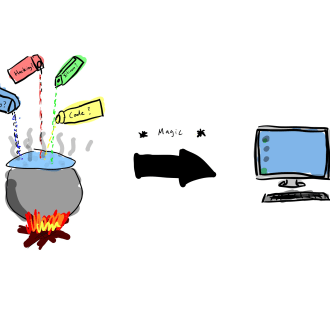
10 Best Articles on Computers
The most useful articles on computers from around the web, curated by thought leaders and our community.
Refind focuses on timeless pieces and updates the list whenever new, must-read articles or videos are discovered.
Top 5 Computers Articles
At a glance: these are the articles that have been most read, shared, and saved on computers by Refind users in 2024 so far.
Short Articles
Short on time? Check out these useful short articles on computers—all under 10 minutes.
Computing Expert Says Programmers Need More Math
Leslie Lamport revolutionized how computers talk to each other. Now he’s working on how engineers talk to their machines.
Programming, just for fun
Programming is fun. Computers have an exciting, almost magical quality to them. Sitting down, typing out a program, and then seeing those symbols come to life at your command – it just feels good.…
Quantum computers: what are they good for?
For now, absolutely nothing. But researchers and firms are optimistic about the applications.
We Taught Computers To Play Chess — And Then They Left Us Behind
The chess machines never stop playing.
The Computers Are Getting Better at Writing
Whatever field you are in, if it uses language, it is about to be transformed.
«Whatever field you are in, if it uses language, it is about to be transformed. The changes that are coming are fundamental to every method of speaking and writing that presently exists.»
Long Articles
These are some of the most-read long-form articles on computers.
Spinning Data into Thought
How Computers Think: Introduction
Common Sense Comes to Computers
The problem of common-sense reasoning has plagued the field of artificial intelligence for over 50 years. Now a new approach, borrowing from two disparate lines of thinking, has made important…
Can computers ever replace the classroom?
Machine learning holds promise for democratizing education. It can bring personalized, interactive learning into reach for anyone with a tablet and an internet connection. This interesting yet unsettling article for The Guardian examines the dark side of AI-assisted learning. Alex Beard – a former teacher and author of Natural Born Learners – describes how, while students are learning through virtual teachers, the providers are learning just as much about them.
The Internet from Rocks — A High Level Explanation of Computers and the Internet
Julian's Blog - The Internet from Rocks — A High Level Explanation of Computers and the Internet
Apple Shares the Secret of Why the 40-Year-Old Mac Still Rules
The pioneering PC revolutionized how people interact with computers. As the Mac enters its fifth decade, Apple says it will continue to evolve.
What is Refind?
Every day Refind picks the most relevant links from around the web for you. Picking only a handful of links means focusing on what’s relevant and useful.
How does Refind curate?
It’s a mix of human and algorithmic curation, following a number of steps:
- We monitor 10k+ sources and 1k+ thought leaders on hundreds of topics—publications, blogs, news sites, newsletters, Substack, Medium, Twitter, etc.
- In addition, our users save links from around the web using our Save buttons and our extensions.
- Our algorithm processes 100k+ new links every day and uses external signals to find the most relevant ones, focusing on timeless pieces.
- Our community of active users gets the most relevant links every day, tailored to their interests. They provide feedback via implicit and explicit signals: open, read, listen, share, mark as read, read later, «More/less like this», etc.
- Our algorithm uses these internal signals to refine the selection.
- In addition, we have expert curators who manually curate niche topics.
The result: lists of the best and most useful articles on hundreds of topics.
How does Refind detect «timeless» pieces?
We focus on pieces with long shelf-lives—not news. We determine «timelessness» via a number of metrics, for example, the consumption pattern of links over time.
How many sources does Refind monitor?
We monitor 10k+ content sources on hundreds of topics—publications, blogs, news sites, newsletters, Substack, Medium, Twitter, etc.
Can I submit a link?
Indirectly, by using Refind and saving links from outside (e.g., via our extensions).
How can I report a problem?
When you’re logged-in, you can flag any link via the «More» (...) menu. You can also report problems via email to hello@refind.com
Who uses Refind?
450k+ smart people start their day with Refind. To learn something new. To get inspired. To move forward. Our apps have a 4.9/5 rating.
Is Refind free?
Yes, it’s free!
How can I sign up?
Head over to our homepage and sign up by email or with your Twitter or Google account.
Keep Learning
Get the big picture on your favorite topics.









